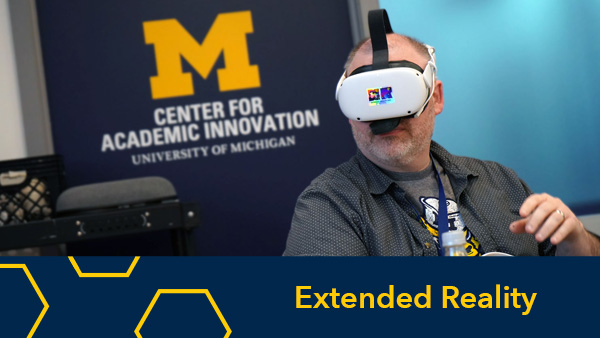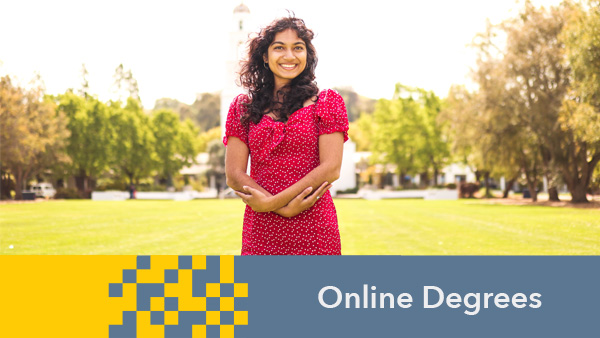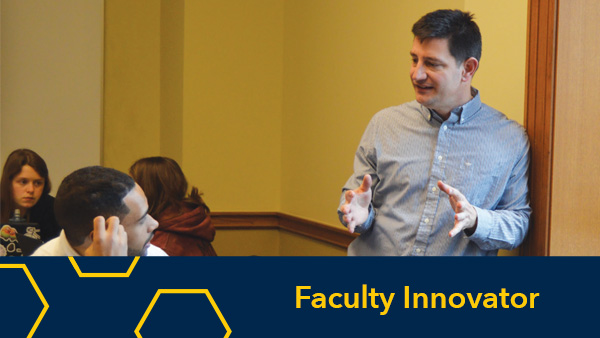Hannah Brauer, Communications Writing Fellow Alum
@brauhan
Eric Joyce, Lead Marketing Specialist
@EricMJoyce
At the Center for Academic Innovation, we aspire to design and develop high-quality online learning experiences and broaden access to these experiences for learners at all levels — and around the world.
We know different learners follow different learning pathways and open online learning experiences can provide a stackable pathway to deeper learning in a way that creates personal value. Affordances in technology allow us to personalize and modularize content from these experiences for learners that are fit-for-purpose based on the mode of instruction, such as a MOOC, Teach-Out, or a more in-depth learning experience like a hybrid or online degree program.
The concept of customizing one piece of instructional content (whether it is a single lecture video, a course module, or nearly an entire learning experience) allows us to better meet the needs of learners and instructors.
We refer to this idea as “remix and reuse” and it is one of our design principles in support of personalized learning at scale.
The following are three examples of “remix and reuse” at the University of Michigan through MOOCs and Teach-Outs.
From a MOOC to a Teach-Out: Act on Climate
The “Act on Climate: Steps to Individual, Community, and Political Action” MOOC was developed by an interdisciplinary team of undergraduate and graduate students, led by faculty lead Michaela Zint, PhD, Arthur F. Thurnau Professor of Environment and Sustainability in the School for Environment and Sustainability.
The course was the first student-created MOOC of its kind at the University of Michigan when it launched in June 2017 and among this team was Benjamin Morse, Design Manager and former student of Zint.
“The goal of the MOOC was to provide more context and tools and procedural knowledge for people who are interested in mitigating and adapting to climate change,” said Morse. “[It was made to] help people that are interested, catalyze that into actual action.”
The course included readings, activities, assignments, and a capstone project. Because the original MOOC was a “heavy lift” for learners, the team recognized the need for a lower-stakes conversation. They decided to expand one of the course’s modules into a Teach-Out that explored the effects of food systems on climate change.
The result was the “Sustainable Food Teach-Out,” which launched in April 2019.
“We wanted to dive deeper into very specific actions that individuals could take to reduce their food-related environmental impact,” said Morse. “A Teach-Out [isn’t] supposed to be about assessment, it’s more focused on bringing people into conversations about social challenges and issues.”
Morse noted the way in which the team created the Teach-Out was not only much quicker than a MOOC, but also resulted in a new mode of teaching despite similar content.
“The way that we scope and design a Teach-Out is very different from the way we develop a MOOC,” Morse said. “The way we have these interviews is more…in conversation and in the moment rather than scripting or creating protocols ahead of time.”
The foundational videos from the original course then became supplemental material for the Teach-Out, demonstrating the nature of “remix and reuse” — learners could digest the conversation in their own way based on the Teach-Out platform, even with similar content to the MOOC.
From a Teach-Out to a MOOC: Solving the Opioid Crisis
The “Solving the Opioid Crisis Teach-Out” launched in December 2017 as a response to the October 2017 declaration by Department of Health and Human Services determining the ongoing opioid crisis was a national public health emergency.
During the Teach-Out’s one-month development, our team connected with experts in multiple health fields through the U-M Institute for Healthcare Policy and Innovation. The conversation focused on defining opioids, understanding the root of the crisis, how to recognize opioid abuse, and next steps for solving the crisis.
Following the launch of the Teach-Out, members of the faculty team submitted a proposal to create a follow-up MOOC about the opioid crisis.
Lauren Atkins Budde, Associate Director of Design Management, led the development of the original Teach-Out. Jeff Bennett, Design Manager, is now leading the development of the MOOC.
“Given the ongoing nature of this crisis, the expertise and on-the-ground experience of so many in the health community here at U-M, and the need for more general educational opportunities in this space, supporting the MOOC was an easy decision,” said Budde.
While the Teach-Out aimed to spread awareness and factual information about the issue to a general audience, the MOOC is targeted toward non-prescribing healthcare providers. A collaborative effort spearheaded by the Institute for Healthcare Policy and Innovation, the Michigan Opioid Prescribing Engagement Network, and the Injury Prevention Center, the MOOC aims to create a deep understanding of the epidemiology of the crisis, pain and drug targeting, prevention of misuse and abuse, addiction treatment and recovery, and public policy implications.
“The hope is that we can help these professionals better understand prevention, intervention, patient/family/community education, and policy related to this important public health problem — and thus, better support their patients and constituents,” said Budde.
From a MOOC to a Teach-Out to a MOOC: Community Organizing for Social Justice
Budde also contributed to the “Community Organizing for Social Justice Teach-Out” with faculty lead Barry N. Checkoway, PhD, Arthur Dunham Collegiate Professor of Social Work and Professor of Urban Planning at the School of Social Work.
“Community Organizing for Social Justice” was originally planned as a MOOC, but while the course was in development, the team saw an opportunity to use its first two modules for a Teach-Out focused on youth organizing. The resulting Teach-Out functioned both as a test-run for the content and contributed to U-M celebrations for Martin Luther King, Jr. Day.
“We were focusing on the MLK portion of Barry’s project portfolio…so that schools and young people would have the Teach-Out to help them think about how they might honor MLK’s legacy by doing projects,” said Budde. “The first two modules [of the MOOC] were really well-suited to that particular event.”
The Teach-Out launched in January 2018, which provided the team with learner feedback about the first two modules.
The team used this feedback to guide the creation of the final MOOC.
“I looked at the comments from the learners and a lot of them wanted more detail about how to use dialogue [or] how to get involved with community organizing,” said Keesa Johnson, a previous Design Manager working on the course.
The MOOC will feature six modules about specific actions learners can take for community organizing. While the Teach-Out focused on younger audiences, the MOOC will is designed for adult learners.
Johnson noted the Teach-Out was a necessary intermediary step for improving the MOOC to reach an older demographic.
“[We’re] taking the content and elevating it to be more general for an adult to use,” she said. “[But] there are still similar values shared between being a community organizer, no matter what age you are.”
Budde agreed the remix and reuse of content was helpful for reaching multiple demographics with different learning objectives.
“[Remix and reuse] allows us to better serve the needs of people who have different goals,” said Budde. “There’s a different audience who may be interested in the engagement-driven and experiential Teach-Outs, or others might be more interested in concept mastery… You still have access to that and it still fits your needs, but it doesn’t put you into a box.”
If you are a faculty member looking to create an online learning experience, submit a proposal to collaborate with the Center for Academic Innovation.


